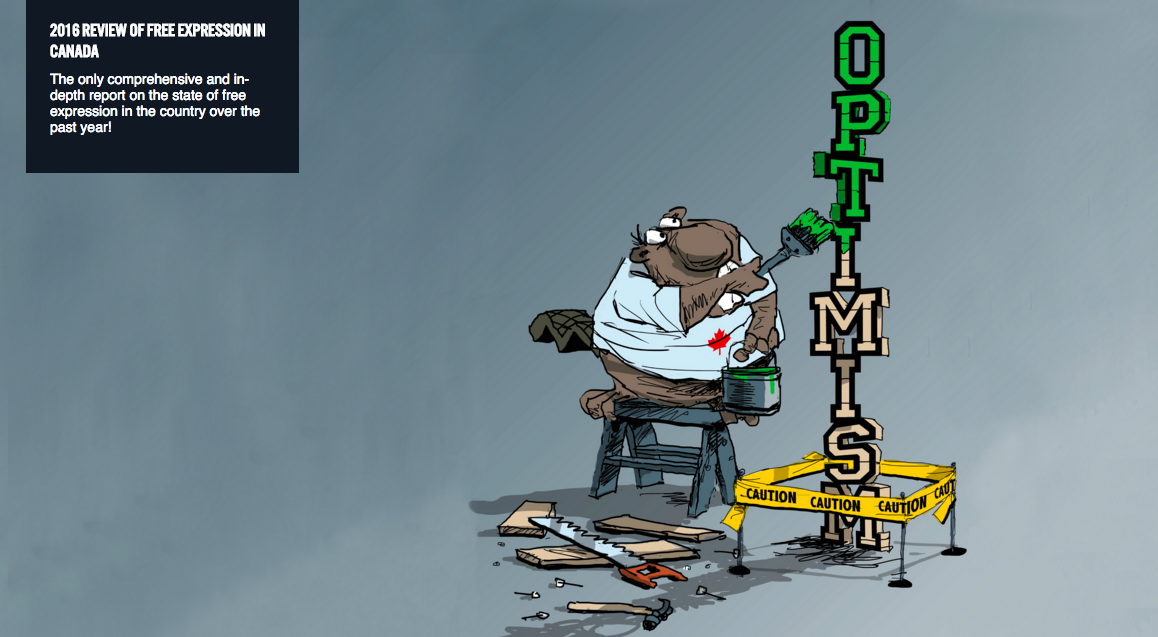CJFE stressed that much of the positive news is promises by a new government, and momentum could still be lost.
By Grant Buckler
There is a note of optimism in Canadian Journalists for Free Expression’s Review of Free Expression in Canada this year, but while the organization’s annual Report Card on free expression issues shows some improvement over previous years, CJFE stressed that much of the positive news is promises by a new federal government, and momentum could still be lost.
“Overall, Canada seems to be moving in the right direction,” the report said. “But this is just a start. Far more work needs to be done to push Canada to a place where the public can fully enjoy their constitutionally protected free expression rights.”
The good news includes an A+ grade for anti-SLAPP legislation in Ontario. Ontario’s anti-SLAPP (Strategic Lawsuit Against Public Participation) legislation, passed earlier this year, protects journalists, activists and other citizens from being hit with frivolous, expensive lawsuits by deep-pocketed businesses and individuals.
Poll results published in the report also found that 54 per cent of Canadians trust the Liberals more than the Conservatives to strike the right balance between protecting the rights of Canadians and our need for secrecy. Sixty-three per cent trust the Liberals more than the Conservatives to be open when it comes to communicating with Canadians about issues facing the government.
The survey, commissioned by CJFE, was conducted between March 31 and April 4. The margin of error for a random survey of 1,000 Canadians is ±3.1 percentage points, 19 times out of 20.
Survey respondents noted a lack of transparency on the recently signed Trans-Pacific Partnership agreement, with a majority saying the government did a poor or very poor job of informing Canadians about the agreement and its impact. Only nine per cent thought it did a good or very good job. In the poll’s final question, survey respondents expressed a mixed opinion on whether the quality of information in news has improved or worsened over the past decade.
This year’s Report Card gives the federal government a C- on access to information. That’s an improvement over last year’s F grade—CJFE applauded the new Liberal government’s promises to review access to information law and give the privacy commissioner more powers, but also questioned some moves the government has already made.
Another C- on Bill C-51, the anti-terrorism legislation, also reflects promises by the new government coupled with concerns that the specifics of the consultation process and potential changes are vague, and the report notes that there are reports that intelligence agencies are pushing back against the reining-in of their powers.
The F grade has not disappeared from this year’s report. The government gets a failing grade for protection of whistleblowers. “On paper, Canada has protections for government whistleblowers; however, in practice, no substantive protections actually exist,” the report said. “The tribunal system established under the last federal government has been completely ineffective, and our new government has shown no interest in reforming it, despite the fact that a few small policy changes could turn it into an effective replica of tribunal systems in other countries. Even worse, Canada has no protections for whistleblowers in the private sector.”
The report gives Montreal police a D for attacks on the press. Journalists covering protests in Montreal have been facing harsh treatment at the hands of the police, including equipment destruction and arbitrary detention. The report said a meeting between representatives from CJFE, Montreal police and journalists has led to promising dialogue and action to cease the violent clashes.
Another area of concern, earning a D grade, is media ownership. “The Canadian media has reached a crisis point. Four companies—Bell, Rogers, Shaw and Telus —own a full 70 per cent of English-language television media, and Bell owns one-third of French-language media,” said the report. “In fact, Canada has the worst diversity in media ownership of any G8 country.” The report goes on to point out the Postmedia’s acquisition of Sun Media further concentrated newspaper ownership.
The Review is launched each year to coincide with World Press Freedom Day, celebrated annually on May 3. The only publication of its kind, the Review looks at the most pressing issues of free expression over the course of the year, and examines trends, breakthroughs and obstacles to freedom of expression in Canada. In-depth analyses will continue to be published on the Review’s digital space throughout the year.
Grant Buckler is a retired freelance journalist and a volunteer with Canadian Journalists for Free Expression and lives in Kingston, Ont.

